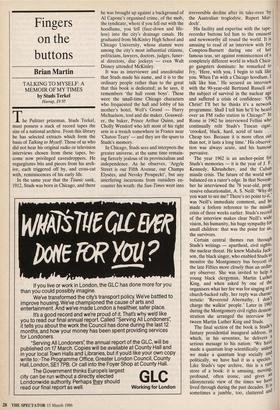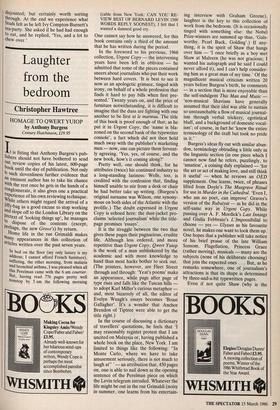Fingers on the buttons
Brian Martin
TALKING TO MYSELF: A MEMOIR OF MY TIMES by Studs Terkel
Harrap, £9.95
The Pulitzer prizeman, Studs Terkel, must possess a stack of record tapes the size of a national archive. From this library he has selected extracts which form the basis of Talking to Myself. Those of us who did not hear his original radio or television interviews chosen from these tapes, be- come now privileged eavesdroppers. He regurgitates bits and pieces from his arch- ive, each triggered off by, and cross-cut with, reminiscences of his early life.
In the same year that the Titanic sank, 1912, Studs was born in Chicago, and there he was brought up against a background of Al Capone's organised crime, of the mob, the syndicate, where if you fell out with the hoodlums, you fell (face-down and life- less) into the city's drainage canals. He graduated from McKinley High School and Chicago University, whose alumni were among the city's most influential citizens, politicians, lawyers, doctors, judges, funer- al directors, disc jockeys — even Walt Disney attended McKinley.
It was as interviewer and anecdotalist that Studs made his name, and it is to the ordinary people rather than to the great that this book is dedicated; as he says, it remembers 'the hall room boys'. These were the small-time Chicago characters who frequented the hall and lobby of his mother's hotel, Well's Grand — Harry Michaelson, tool and die maker, Gossweil- er, the baker, Prince Arthur Quinn, and Cholly Wendorf who left most of his right arm in a trench somewhere in France near `Chatoo Teary' — and they are the spurs to Studs's memory.
In Chicago, Studs sees and interprets the greater universe, at the same time remain- ing fiercely jealous of its provincialism and independence. As he observes, 'Argyle Street is our Fifth Avenue, our Champs Elysees, and Nevsky Prospeckt', but any interfering incursions from outsiders en- counter his wrath: the Sun-Times went into irreversible decline after its take-over `by the Australian troglodyte, Rupert Mur- doch'.
His facility and expertise with the tape- recorder buttons led him to the eminent and newsworthy all round the world. It is amusing to read of an interview with Ivy Compton-Burnett during one of her famous teas, set against reminiscences of a completely different world in which Chica- go gangsters dominate: he remarked to Ivy, 'Here, with you, I begin to talk like you. When I'm with a Chicago hoodlum, I talk like him.' He secured an interview with the 90-year-old Bertrand Russell on the subject of survival in the nuclear age and suffered a crisis of confidence: `Oh Christ! I'll bet he thinks it's a network programme. Shall I tell him he'll be heard over an FM radio station in Chicago?' In Rome in 1962 he interviewed Fellini who continually relit Studs's Tuscan cigar, 'crooked, black, hard, acrid of taste . . • Cheap too. Because it is more often out than not, it lasts a long time.' His observa- tion was always acute, and his humour pervasive. The year 1962 is an anchor-point for Studs's memories — it is the year of J. F. Kennedy, Khrushchev, and the Cuban missile crisis. The future of the world was balanced on a razor's edge. In that Novem- ber he interviewed the 78 year-old, prog- ressive educationalist, A. S. Neill: 'Why do you want to see me? There's no point to it, was Neill's immediate comment, and he made a forlorn reference to the missile crisis of three weeks earlier. Studs's record of the interview makes clear Neill's wide vision, his humanity, his huge sympathy for small children: that was the point for us, the survivors.
Certain central themes run through Studs's writings — apartheid, civil rights, the nuclear threat. He knew Mahalia Jack- son, the black singer, who enabled Studs t° monitor the Montgomery bus boycott of the late Fifties more closely than an ordin- ary observer. She was invited to help 3 young black clergyman, Martin Luther King, and when asked by one of the organisers what her fee was for singing at 3 church-backed rally, her reply was charac: teristic: 'Reverend Abernathy, I don t charge the walkin' people.' Later in 1965 during the Montgomery civil rights demon" stration she arranged the interview be- tween Martin Luther King and Studs. , The final section of the book is Studs 5 fantasy presidential inaugural address, n) which, in his seventies, he delivers a serious message to his nation: 'We have made a quantum leap scientifically: unless.i we make a quantum leap socially ant; politically, we have had it as a species. Like Studs's tape archive, this is a fare store of a book: it is amusing, moving, profound, often ironic, and gives ari idiosyncratic view of the times we ha'.c lived through during the past decades. It Is, sometimes a jumble, too, cluttered at° disjointed; but certainly worth sorting through. At the end we experience what Studs felt as he left Ivy Compton-Burnett's tea-party. She asked if he had had enough to eat, and he replied, 'Yes, and a lot to chew over.'



















































 Previous page
Previous page